初升高英语衔接知识1,2讲
- 格式:doc
- 大小:128.50 KB
- 文档页数:15
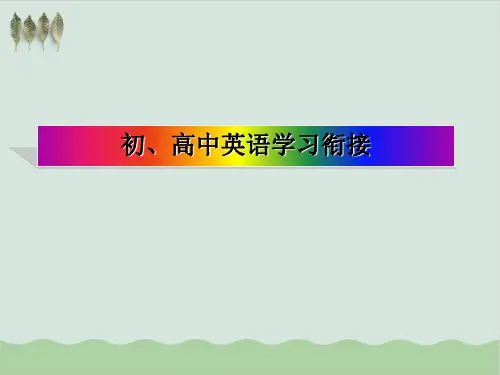
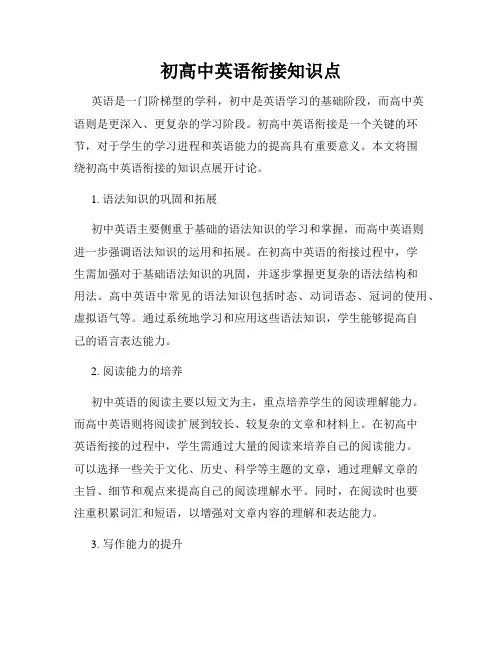
初高中英语衔接知识点英语是一门阶梯型的学科,初中是英语学习的基础阶段,而高中英语则是更深入、更复杂的学习阶段。
初高中英语衔接是一个关键的环节,对于学生的学习进程和英语能力的提高具有重要意义。
本文将围绕初高中英语衔接的知识点展开讨论。
1. 语法知识的巩固和拓展初中英语主要侧重于基础的语法知识的学习和掌握,而高中英语则进一步强调语法知识的运用和拓展。
在初高中英语的衔接过程中,学生需加强对于基础语法知识的巩固,并逐步掌握更复杂的语法结构和用法。
高中英语中常见的语法知识包括时态、动词语态、冠词的使用、虚拟语气等。
通过系统地学习和应用这些语法知识,学生能够提高自己的语言表达能力。
2. 阅读能力的培养初中英语的阅读主要以短文为主,重点培养学生的阅读理解能力。
而高中英语则将阅读扩展到较长、较复杂的文章和材料上。
在初高中英语衔接的过程中,学生需通过大量的阅读来培养自己的阅读能力。
可以选择一些关于文化、历史、科学等主题的文章,通过理解文章的主旨、细节和观点来提高自己的阅读理解水平。
同时,在阅读时也要注重积累词汇和短语,以增强对文章内容的理解和表达能力。
3. 写作能力的提升初中英语的写作主要以句子和短文的书写为主,侧重于表达语法准确、逻辑清晰的观点。
而高中英语则要求学生在写作中更加注重词汇的丰富和句子结构的多样化。
在初高中英语衔接的过程中,学生需通过多样化的写作练习来提升自己的写作能力。
可以从写日记、写作文、写小说等方面入手,尝试使用更多的词汇和句型,以及提高语言的流畅度和表达的准确性。
4. 口语表达能力的培养初中英语的口语主要以课堂上的问答和简单对话为主,侧重于培养学生的口头表达能力。
而高中英语则要求学生在口语交流中更加注重用词的准确性和语法的正确性。
在初高中英语衔接的过程中,学生应该通过参加英语角、口语比赛等活动来提升自己的口语表达能力。
可以选择一些话题,与同学或外教进行口语练习,锻炼自己的听、说能力。
5. 课外拓展学习除了课堂上的学习,学生还可以通过其他途径进行课外拓展学习。
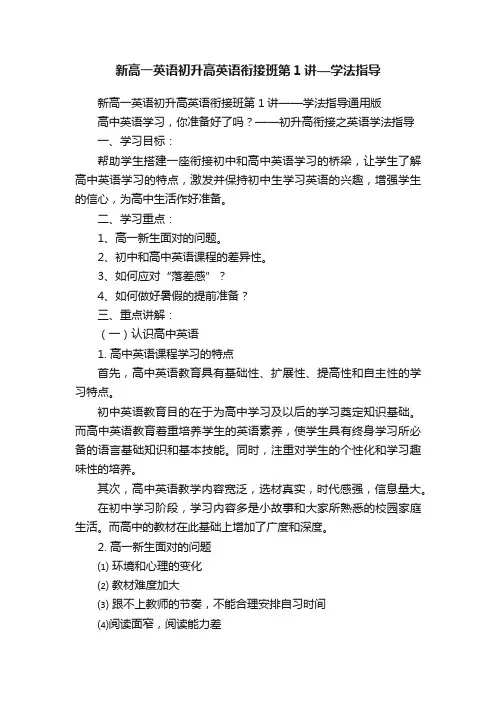
新高一英语初升高英语衔接班第1讲—学法指导新高一英语初升高英语衔接班第1讲——学法指导通用版高中英语学习,你准备好了吗?——初升高衔接之英语学法指导一、学习目标:帮助学生搭建一座衔接初中和高中英语学习的桥梁,让学生了解高中英语学习的特点,激发并保持初中生学习英语的兴趣,增强学生的信心,为高中生活作好准备。
二、学习重点:1、高一新生面对的问题。
2、初中和高中英语课程的差异性。
3、如何应对“落差感”?4、如何做好暑假的提前准备?三、重点讲解:(一)认识高中英语1. 高中英语课程学习的特点首先,高中英语教育具有基础性、扩展性、提高性和自主性的学习特点。
初中英语教育目的在于为高中学习及以后的学习奠定知识基础。
而高中英语教育着重培养学生的英语素养,使学生具有终身学习所必备的语言基础知识和基本技能。
同时,注重对学生的个性化和学习趣味性的培养。
其次,高中英语教学内容宽泛,选材真实,时代感强,信息量大。
在初中学习阶段,学习内容多是小故事和大家所熟悉的校园家庭生活。
而高中的教材在此基础上增加了广度和深度。
2. 高一新生面对的问题⑴ 环境和心理的变化⑵ 教材难度加大⑶ 跟不上教师的节奏,不能合理安排自习时间⑷阅读面窄,阅读能力差⑸ 缺乏良好的学习习惯如果上述问题在高一时得不到及时解决,长此以往,会使学生对英语学习逐渐丧失热情,信心受挫,屡战屡败,最后一蹶不振,甚至会影响对其他科目的学习热情。
(二)知识目标与能力要求1. 初中和高中英语学习的差异性(1)词汇量初中:1500-1600个单词;200-300个词组高中:3300个单词;400-500个词组(2)语法:初中:死记硬背,浅显零星高中:系统全面,难度加大1. 英语高考听力题:听力原文:——My Godness! It’s freezing here in the room.——I’m sorry, Madam. It will be OK as soon as I turn the heating on.What does the man mean?A. The room will be warmer.B. The fridge will be fixed.C. The lights will be swithed on.2. (单选题)——He say that my news car is a ________ of money.——Don’t you think those words are just sour grapes?A. lackB. loadC. questionD. waste(三)学习方法指导1. 培养良好的学习方法⑴ 课前预习,课后复习,向课堂要质量⑵ 充分利用好错题本和笔记本⑶ 注重语言积累2. 改变观念,突出重点高中英语学习有两大重点:词汇和阅读。

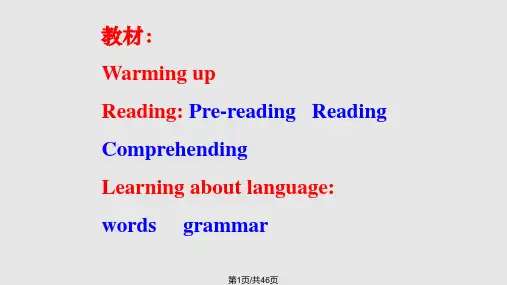
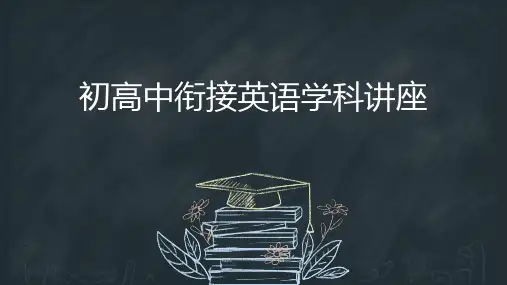
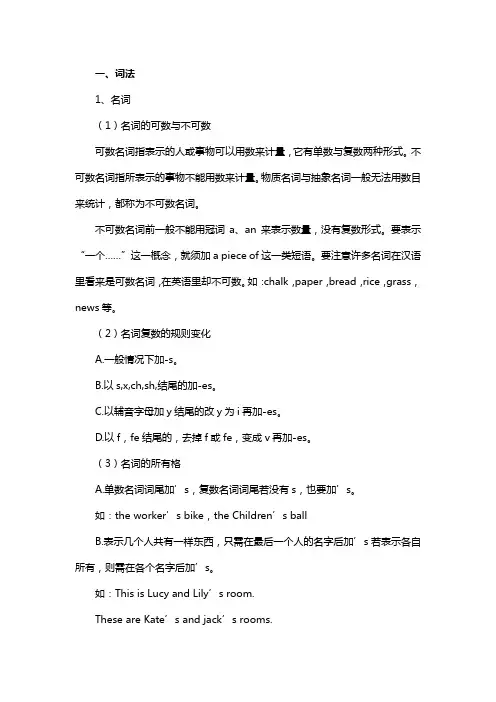
一、词法1、名词(1)名词的可数与不可数可数名词指表示的人或事物可以用数来计量,它有单数与复数两种形式。
不可数名词指所表示的事物不能用数来计量。
物质名词与抽象名词一般无法用数目来统计,都称为不可数名词。
不可数名词前一般不能用冠词a、an来表示数量,没有复数形式。
要表示“一个……”这一概念,就须加a piece of这一类短语。
要注意许多名词在汉语里看来是可数名词,在英语里却不可数。
如:chalk,paper,bread,rice,grass,news等。
(2)名词复数的规则变化A.一般情况下加-s。
B.以s,x,ch,sh,结尾的加-es。
C.以辅音字母加y结尾的改y为i再加-es。
D.以f,fe结尾的,去掉f或fe,变成v再加-es。
(3)名词的所有格A.单数名词词尾加’s,复数名词词尾若没有s,也要加’s。
如:the worker’s bike,the Children’s ballB.表示几个人共有一样东西,只需在最后一个人的名字后加’s若表示各自所有,则需在各个名字后加’s。
如:This is Lucy and Lily’s room.These are Kate’s and jack’s rooms.C.如果是通过在词尾加-s构成的复数形式的名词,只加’。
如:the students’books,the girls’blouses(另外:如果名词是有生命的,我们就用’s结构来表示所有关系。
如果名词所表示的事物是无生命的,我们就要用名词+of+名词的结构来表示所有关系。
)2、代词人称代词,物主代词,反身代词,指示代词,不定代词(1)人称代词第一人称单数I me my mine myself复数we us our ours ourselves第二人称单数you you your yours yourself复数you you your yours yourselves第三人称单数he him his his himselfshe her her hers herselfit it its its itself复数they them their theirs themselves(2)物主代词物主代词的用法:形容词性物主代词后面一定要跟一个名词;名词性物主代词可作主语、表语、宾语。
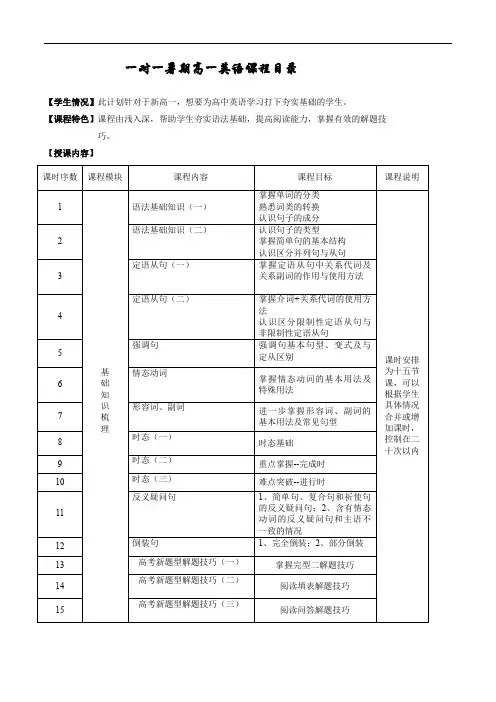
一对一暑期高一英语课程目录【学生情况】此计划针对于新高一,想要为高中英语学习打下夯实基础的学生。
【课程特色】课程由浅入深,帮助学生夯实语法基础,提高阅读能力,掌握有效的解题技巧。
【授课内容】精彩内容片段: 倒装句精益导读If you don’t learn to think when you are young, you may never learn. (Thomas Edison, American inventor)如果你年轻时就没有思考,那么就永远学不会思考。
(美国发明家爱迪生.T.)益思精析主语和谓语有两种顺序:主语在前,是自然语序;主语在后,是倒装语序,又分为全部倒装句和部分倒装。
全部倒装:把整个谓语部分放在主语之前。
注意:谓语动词的数要与后面主语保持一致。
1. 用于地点副词here, there, 方位副词out, in, up, down, away及时间副词now, then等开头的句子里,以示强调铃声响了。
看,他们来了。
倒装要求:主语必须是名词,主语是人称代词时,主语和谓语语序不变。
在这儿。
他走了。
这类倒装句式一般只用一般现代时和一般过去时。
男孩儿们冲了出去。
2. 当表示地点的介词短语放句首时使用全部倒装。
此时谓语多为be, lie, sit, stand, come, walk等不及物动词;倒装时不需要助动词。
桌子地下是三只猫。
塔前面流过一条小溪。
3. there放句首时,要用全部倒装句式。
在“there+be”结构中的谓语动词有时不用be,而用表示类似“存在”观念的其他不及物动词。
如:live, stand, come, lie, flow, enter, rise和appear等。
河中传来呼救声。
许多年前在一栋木房子里住着一个老人。
4. 表语置于句首时,倒装结构为“表语+系动词+主语”。
(1) 形容词+系动词+主语到会的是格林先生,一个校长。
(2) 过去分词+系动词+主语躲在门后面的是一些顽皮的孩子。
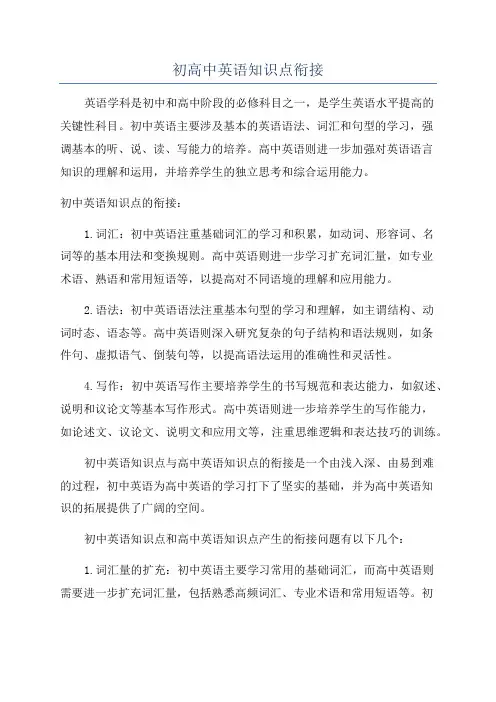
初高中英语知识点衔接英语学科是初中和高中阶段的必修科目之一,是学生英语水平提高的关键性科目。
初中英语主要涉及基本的英语语法、词汇和句型的学习,强调基本的听、说、读、写能力的培养。
高中英语则进一步加强对英语语言知识的理解和运用,并培养学生的独立思考和综合运用能力。
初中英语知识点的衔接:1.词汇:初中英语注重基础词汇的学习和积累,如动词、形容词、名词等的基本用法和变换规则。
高中英语则进一步学习扩充词汇量,如专业术语、熟语和常用短语等,以提高对不同语境的理解和应用能力。
2.语法:初中英语语法注重基本句型的学习和理解,如主谓结构、动词时态、语态等。
高中英语则深入研究复杂的句子结构和语法规则,如条件句、虚拟语气、倒装句等,以提高语法运用的准确性和灵活性。
4.写作:初中英语写作主要培养学生的书写规范和表达能力,如叙述、说明和议论文等基本写作形式。
高中英语则进一步培养学生的写作能力,如论述文、议论文、说明文和应用文等,注重思维逻辑和表达技巧的训练。
初中英语知识点与高中英语知识点的衔接是一个由浅入深、由易到难的过程,初中英语为高中英语的学习打下了坚实的基础,并为高中英语知识的拓展提供了广阔的空间。
初中英语知识点和高中英语知识点产生的衔接问题有以下几个:1.词汇量的扩充:初中英语主要学习常用的基础词汇,而高中英语则需要进一步扩充词汇量,包括熟悉高频词汇、专业术语和常用短语等。
初中阶段的词汇积累为高中英语的学习提供了基础,但在高中阶段仍需要进一步扩充和记忆词汇,以适应更高要求的阅读和写作任务。
2.语法规则的拓展:初中英语主要学习基本的语法规则和句型,如主谓结构、动词时态和语态等。
而高中英语则需要进一步学习复杂的语法规则和句子结构,如条件句、虚拟语气和倒装句等。
初中阶段的语法学习为高中英语的学习提供了基础,但在高中阶段还需要进一步深入学习和理解语法规则,以提高语法运用的准确性和灵活性。
3.阅读理解能力的提升:初中英语注重对短文和文章的基本理解和阅读技巧的培养,如找关键词、推理和判断等。
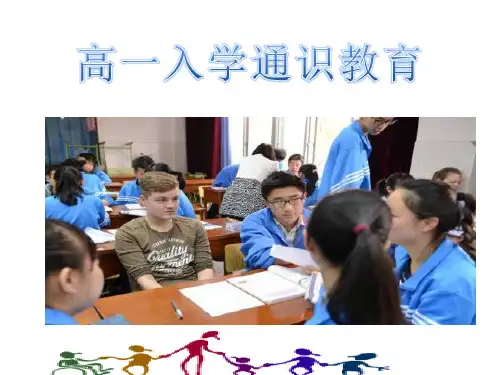
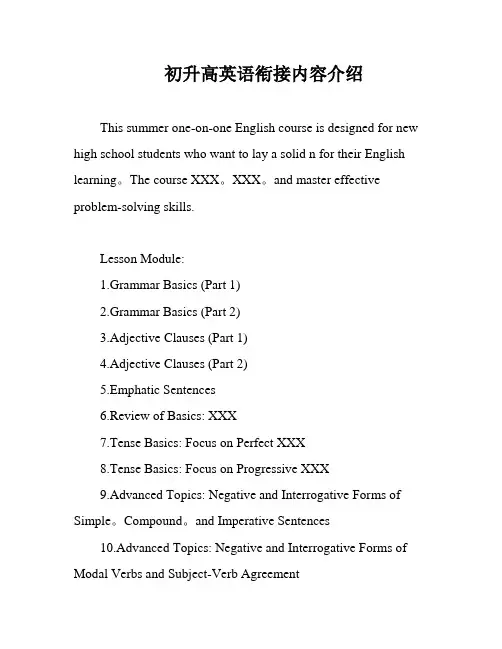
初升高英语衔接内容介绍This summer one-on-one English course is designed for new high school students who want to lay a solid n for their English learning。
The course XXX。
XXX。
and master effective problem-solving skills.Lesson Module:1.Grammar Basics (Part 1)2.Grammar Basics (Part 2)3.Adjective Clauses (Part 1)4.Adjective Clauses (Part 2)5.Emphatic Sentences6.Review of Basics: XXX7.Tense Basics: Focus on Perfect XXX8.Tense Basics: Focus on Progressive XXX9.Advanced Topics: Negative and Interrogative Forms of Simple。
Compound。
and Imperative Sentences10.Advanced Topics: Negative and Interrogative Forms of Modal Verbs and Subject-Verb AgreementCourse Objectives:Master word nFamiliarize with word class nXXXXXXMaster basic structure of simple sentencesDistinguish XXXMaster the use of relative pronouns and adverbs in adjective clausesMaster the use of XXXDistinguish een restrictive and non-restrictive adjective clausesXXXMaster basic and special uses of modal verbsXXX adjectives and adverbs and common XXXFocus on perfect tenses in tense basicsXXXXXXXXXXXX formatCourse le:The course consists of 15 lessons。
初高中英语衔接专题一:名词考点集汇,讲解和训练一、名词的数1.单数和复数可数名词有单数和复数两种形式。
复数形式通常是在单数形式后加词尾“-s”构成,其主要变法如下:(1)一般情况在词尾加-s,例如:book→books,girl→girls,boy→boys,pen→pens,doctor→doctors, boy→boys。
(2)以s,x,ch,sh,结尾的词加-es,例如:bus→buses,class→classes box→boxes,watch→watches,brush→b rushes。
(3)以ce, se, ze,(d)ge结尾的名词加s,例如:orange—oranges。
(4)以辅音母加y结尾的词变“y”为“i”再加-es,例如:city→cities, factory→factories, country→countries, family→families。
但要注意的是以元音字母加y结尾的名词的复数形式只加s,如:boy→boys, day→days。
(5)以o结尾的词多数都加-es。
例如:hero→heroes,potato→potatoes,toma to→tomatoes,但词末为两个元音字母的词只加-s。
例如:zoo→zoos,radio→radios,还有某些外来词也只加-s,例如:photo→photos,piano→pianos。
(6)以f或fe结尾的词,多数变f为v再加-es,例如:knife→knives,leaf→leaves, half→halves。
复数词尾s(或es)的读音方法如下表所示。
复数词尾s(或es)的读音方法(7)少数名词有不规则的复数形式,例如:man→men,woman→women,tooth→teeth,foot→feet,child→children,mouse→mice。
【注意】与man和woman构成的合成词,其复数形式也是-men和-women。
初升高英语衔接知识第1讲重、难点:(一)认识初、高中英语的区别即将开始的高中学习生活,特别是英语的学习是与初中阶段有着很大不同的:1. 课本编排上的区别:初中的每一个单元是分为4课的,每篇中有的是对话,有的是阅读文,也配有一些练习,而高中的每个单元并不分课,而是基本上按版块划分,大体为“Warming up”(热身),即是针对本单元的话题提出的一些问题,以练习口语的形式做引子,便于进入本单元的主题,然后为“listening”(听力)和“speaking”(说),这两部分都是旨在进一步提高我们的听、说能力,难度较初中有较大的提高,请同学们做好准备。
下个部分就是“Reading”了,高中的阅读文分为阅读前和阅读后的讨论、思考问题并加入了有关的语言知识的学习及练习,可以说在内容上是极大地丰富了。
除此之外还会有稍短的阅读,写作等方面的练习,即“Integrating skills”(综合训练)当然书后的workbook也与初中不同,内容更为丰富,练习也更多。
2. 在词汇上的区别:我们初中的教材已是新版本了,每个单元的单词可能大家觉得已经不少了,但高中教材中的词汇更是成倍甚至是成三倍地增加了,这也是新编教材的一个特点,加入了许多当前常用的,新出现的流行的词汇,也是与我们学的新编初中课本相承接的,所以,为了能尽快适应高中词汇的学习,我们应该及早着手把初中阶段的词汇再熟悉一遍。
另外,对于高中英语词汇的学习,大家还要知道其要求是远远高于初中的,在学习单词时,我们既要了解它在文中的意思,还要掌握它在练习中,考试中可能出现的所有意思,用法及搭配等。
3. 在所学语法上的区别:在初中阶段我们把基础的语法内容已经学习过了,而在高中我们要学习的是更深更高层次的语法。
如定语从句,非谓语动词、名词性从句,倒装结构、虚拟语气等等,其中的部分内容我们并不陌生,但是初中我们所接触的还只是皮毛,高中阶段的学习会比之前的所学内容复杂得多,所以我们要充分利用暑假把之前的漏洞弥补好,在后面的学习中,我们也会一起与大家重温这些知识并将之与高中内容做一对比,为大家步入高中学习打好基础。
4. 在课堂要求上的区别:大部分的初中对学生的要求还是比较严格的,而这种严格与小学又是不同的,所以有一部分自觉性差的学生就被分化出来,在稍微宽松的环境中,对自己要求降低导致了滑坡的出现,而升入高中后又会有新的变化,对于自律要求就更加明显了。
如果你是按照老师要求做的学生,那么在高中除了把基本要求做好之外,自己一定不可放松,适当增加课外阅读及一些课外习题是有必要的;如果你是不太自觉的学生,那么你要努力改掉自己的毛病,除了完成要求交给老师的作业,那些如读、背等要求也要认真完成才能使自己的高中英语学习逐步走上轨道。
不管你属于哪一种,都要持之以恒,千万不可因为任何原因而放松对自己的要求,即便是你已取得了一定成绩,也没有理由沾沾自喜。
5. 在考试评估制度上的区别:这一区别可能是影响最大的一点,我们许多同学初中英语一直较差的原因在很大程度上是由于初中这种不正常的考试制度,很多人认为英语不用下功夫学,反正最后背背答案就可过关,这样成绩不错,学得也很轻松。
一旦抱有这种想法,初中这个重要的打基础的阶段就被荒废过去了,这对我们升入高中后的英语学习是极为不利的,这就好比是建造没有基础的空中楼阁,肯定会感到很难,很吃力。
进入高中之后我们的考试是没有范围的,不能靠背答案过关,而且所学所考的内容应该都是向高考看齐的,难度肯定不小,但同学们也不要害怕,只要认真努力,坚持不懈,做好充分迎接失败的心理准备,然后在每次经历中吸取经验,一点点地弥补自己的不足,肯定会取得很好的成绩。
(二)基础语法再回顾——句子结构英语的句子结构组成是与汉语有着很大区别的,我们在学习的时候,很多同学受母语的影响太大,在英文写作时完全按照汉语的顺序将英文进行堆砌,这是因为我们对于英文句子的构成尚未掌握或掌握得不熟练,没有形成英语语言习惯。
规范的英文是由“主语+谓语+其他”。
这种基本形式构成的,这种只有一套主、谓的句子叫做简单句,它有5种基本形式,即主+谓(vi.);主+系+表;主+谓(vt.)+宾;主+谓+宾+宾补;主+谓+间接宾语+直接宾语。
由此可见,要想用英文正确表述一个意思,写成一句话,必须要有的就是主语和可以充当谓语的动词,而且当这个动词为不及物动词时,其后不可加宾语,当它是及物动词时,要根据要求和该词的用法在其后加上宾语或宾语及宾补或加上双宾语。
当然在这5种形式中系表结构也是很常用,很重要的一种,而且系表动词常容易和实义动词相混,从而导致了一些病句的出现。
综上所述,我们要想较好地掌握英文的句子结构必须弄清以下几点内容:1. 可以充当谓语的几种形式:既然谓语部分是构成句子的必要成份,那么掌握好它就起到了举足轻重的作用,谓语部分可由以下几种构成方式:(1)不及物动词可以单独充当谓语。
如:They arrived yesterday .(2)及物动词要加上宾语之后才可构成完整的结构,另外,如果不及物动词后加上了一定的介词,那么介词后也要有宾语才能完整。
如:They reached Tianjin yesterday .They arrived in Tianjin yesterday . 他们昨天到达了天津。
(3)系表结构可以构成谓语。
如:She is a student . 她是个学生。
He felt very happy . 他感到很高兴。
(4)情态动词要加上动词原形后才可构成完整的谓语部分。
如:We should protect our environment . 我们应该保护环境。
那么,动词的哪些形式可构成谓语呢?①行为动词的原形:do②行为动词的第三人称单数:does③行为动词的过去式:did④be+行为动词-ing形式:be doing⑤be+行为动词的过去分词:be done⑥will+行为动词原词:will do⑦have / has / had+行为动词过去分词:have / has / had done⑧系表动词+表语2. 系表动词与行为动词的区别:系表动词是表示状态变化等的动词,它包括be动词及一些可充当系表动词的实义动词,其中后者在充当系表动词时含义与充分行为动词时是不同的。
系表动词后面接的是表语,而可以充当表语的是一些可以表示状态、特征、特性等内容的词或结构,如形容词、名词、介词短语一些副词、从句等等。
这里我们尤其要注意的就是可充当表语的一些副词指的是可以表征状态特点的副词,如:Class is over . 中的over表示的就是“结束了,完了”的这种状态。
而很多副词并没有这种功能,自然也就不可以充当表语,如happy和happily,前者为形容词可表示主语的状态,而后者是形容以何方式做的某事,是在修饰动作,而非表示状态,因而,前者可作表语,后者则不可充当表语。
行为动词则是指描述具体或抽象行为、动作的动词,它可分为及物动词和不及物动词两种,如果想修饰这样的动词,则需要像happily这样的副词或是有相似的功能的词或结构。
如:She went home happily . 她高兴地回家了。
He did it with great difficulty . 我费了很大劲才完成了这件事。
3. 要掌握准动词的性质、用法及搭配:在学习动词时,尤其是重点动词,我们一定要知道它是哪种动词,及物?不及物?可否充当系表动词?有的动词性质较多,可能同时具有多种性质,这就需要我们注意它在何时可充当哪种动词。
另外,对于动词的用法我们也要掌握,如每个动词后可带或常带什么结构,它有哪些习惯搭配,可构成什么词组等。
4. 在写简单句时的方法:我们要注意简单句的顺序一般应为主、谓、宾,而一些状语如时间、地点方式等等状语则要放到主要结构后面出现。
当然,有时为了强调或语言的表达需要,状语的位置会有所变化,但我们在写句子时一定要把握好以上原则,而不能按照汉语去逐个翻译。
如“我们骑车去上学。
”这个句子如果按照汉语习惯很可能会写成:We by bike go to school .或更有甚者可能还会写出类似这样的句子:We by bike to go to school .或We take a bike go to school . 等等错误的句子。
但如果我们按照英文习惯来写就不会出现以上错误了,主语We+谓语go to school+状语by bike也就是We go to school by bike .【模拟试题】词语辨析(一)1. —Do you like the music the Moonlight Sonata ? —Yes , it really beautiful .A. feelsB. soundsC. listensD. hears2. The Internet it easy to get much new information in a short time .A. findsB. makesC. feelsD. takes3. —Oh , you painted the walls yourself ? —Yes . It was not hard . The whole work didn’t much .A. wantB. costC. spendD. pay4. Soon Wu Dong up with Li Lei , then they were neck and neck .A. taughtB. caughtC. boughtD. brought5. They will Guangzhou tonight .A. arriveB. getC. reachD. go6. —Do you still have a headache , Billy ? —No , it’s. I’m all right now , mum .A. droppedB. runC. leftD. gone7. It will about half an hour to get to the park by bus .A. spendB. costC. wantD. take8. I didn’t quite what the teacher said . Could you ask him to it again ?A. catch , speakB. hear , talkC. follow , explainD. listen , say9. —will you finish your homework ? —In half an hour .A. How longB. How soonC. How oftenD. What time10. They watched the game , and then they were invited to it .A. joinB. join inC. take partD. attend11. It’s going to rain . We’d better our things , so that they will not get wet .A. put upB. put downC. put awayD. put in12. —Where can we get a football ? —Let’s .A. lend Jim oneB. lend one to JimC. borrow one from JimD. borrow one of Jim13. When she was 22 years old , her dream to be a teacher .A. came trueB. come trueC. came realD. come real14. It’s that some foreign students will come to our school next week .A. sureB. rightC. realD. true15. We made several different plans for out holiday , but we went to Huangshan .A. at the endB. in the endC. by the endD. to the end16. He was looking very with himself , so I knew he had passed the examination .A. pleaseB. pleasingC. pleasedD. pleasant17. He had a strange way of making his class and interesting .A. liveB. livelyC. livingD. alive18. —When is he going to leave ? —next week .A. SometimeB. Some timeC. SometimesD. Some times19. What words can you talk about the picture ?A. used toB. use toC. look forD. look up20. Ted , the radio is too loud . Please .A. turn it overB. turn it onC. turn it backD. turn it down21. —Will the foreigners have any problems talking with Chinese in 2008 ?—I don’t think so . Now the young the old can speak some English .A. either , orB. not only , but alsoC. neither , norD. both , or22. —Look ! The bus is coming .—But there are too many people . We can’t it .A. get offB. get downC. get onD. get up23. Again and again the doctor the crying girl , but he couldn’t find out what was wrong with her .A. looked overB. looked afterC. looked forD. looked out24. —Hello ! Can I speak to Alice , please ? —, please .A. Call onB. Go onC. Hold onD. Carry on词语辨析(二)1. Don’t the road when the light is red .A. acrossB. crossC. passD. past2. I’m thirsty . Please me something to drink .A. takeB. bringC. carryD. show3. If you to learn a foreign language well , you must practise it every day .A. likeB. loveC. wantD. think4. This digital camera is so expensive that I can’t it .A. carryB. useC. payD. afford5. I’m not tall enough to the book on the top of the shelf .A. feelB. takeC. arriveD. reach6. We are going to plant trees tomorrow . Would you like to us ?A. followB. shareC. joinD. enjoy7. I you a pleasant journey .A. wishB. hopeC. expectD. want8. What would you like to us about your hometown ?A. speakB. talkC. tellD. say9. Young people must learn to what is right and what is wrong .A. speakB. talkC. tellD. say10. Did you your pen-friend every month ?A. heard aboutB. hear fromC. heard ofD. hear to11. This is very difficult . I can’t work it out .A. mathB. physicsC. questionD. problem12. The young lady over there our new English teacher .A. mayB. maybeC. may beD. can be13. We should keep in the reading-room .A. quietB. quietlyC. quiteD. quickly14. There was a strange sound outside . Mary went out and around , but she nothing .A. looked , sawB. saw , sawC. watched , lookedD. looked , find15. Father is sleeping . Please the radio .A. turn onB. put downC. turn downD. put on16. It’s not polite to others when they are in trouble .A. get on well withB. play games withC. laugh atD. wait for17. Jack always runs faster than Peter , but this time he him .A. went overB. fell behindC. put offD. dropped off18. More and more foreigners want to their companies in Dalian .A. clean upB. look upC. pick upD. open up19. —Can I use the expression in the text ? —No . It has . Nobody uses it today .A. given upB. broken downC. gone outD. got off20. I don’t know Sam’s telephone number . Will you please in your address book for me ?A. look up itB. look it upC. look for itD. look at it21. We could see nothing because the lights suddenly .A. went onB. went overC. went downD. went out22. Ann is so careful that she always goes over her exercises to there are no mistakes .A. look forB. make sureC. find outD. think about23. Mrs. Green is out , I have to her baby at home .A. look atB. take outC. look forD. take care of24. They often help the farmers to the crops in autumn .A. get inB. get onC. get backD. get to词语辨析(三)1. Let’s him a message to meet us at the station .A. takeB. getC. leaveD. receive2. Never forget to “ Excuse me ” when you trouble somebody .A. sayB. speakC. tellD. talk3. The war another three years before it ended in 1864 .A. hadB. wentC. foughtD. lasted4. The girl’s team us in the football match .A. beatB. knockC. hitD. won5. He spoke so fast that I could not what he said .A. touchB. catchC. hearD. find6. We can what is happening on the other side of the world by telephone .A. learnB. hearC. seeD. understand7. This bus was built to less than 60 passengers .A. carryB. takeC. acceptD. keep8. The meeting room is large enough to fifty people .A. keepB. haveC. holdD. fill9. I got up late this morning , so I had a breakfast and hurried to school .A. fastB. quickC. rapidD. soon10. Many people were burnt to in the fire .A. dieB. deadC. deathD. dying11. She has been in Tianjin for ten years . Tianjin has become her second .A. familyB. houseC. homeD. room12. We Chinese have sent a spaceship into .A. spaceB. skyC. heavenD. universe13. Tom’s ill in hospital and his mother is him .A. looking forB. looking overC. looking atD. looking after14. China another spaceship , “ Shenzhou III ” into space in March from the Satellite Centre in China .A. put upB. put offC. sent upD. sent away15. The students in our class very well with each other .A. get inB. get upC. get onD. get to16. Tim felt too hungry when he got home . He quickly all the food on the table .A. ate upB. looked upC. took upD. ate out17. The ticket is on the floor . Could you please for me ?A. pick it upB. pick up itC. pick up themD. pick them up18. You may and then decide if you’ll buy it .A. try on itB. try out itC. try it onD. try it out19. —What’s wrong with your aunt , Bill ? —She’s very ill . A doctor must be .A. sent backB. sent upC. sent awayD. sent for20. The government will some new colleges for more students to receive higher education .A. set upB. set outC. put downD. put on21. “ Get a ladder , please . I can’t . ” Jim said in a tall tree .A. come backB. come outC. come downD. come over22. —Did Jack come for the meeting last night ?—No . He was so tired that he soon in his room .A. fell behindB. fell offC. fell asleepD. fell over23. If you don’t know a word , you must the word in a dictionary .A. look upB. look downC. look overD. look out24. Please the TV . I’d like to see the TV play .A. turn upB. turn onC. turn downD. turn off词语辨析(四)1. If you make a lot of , you may disturb others .A. noiseB. noisyC. voiceD. sound2. Dad told us a very interesting story , which made all of us .A. smileB. smilingC. laughD. laughing3. My father is ill . I stay at home and look after him .A. have toB. mustC. don’t have toD. mustn’t4. I’m sure our football team will the team from No. 3 Middle School .A. winB. beatC. loseD. fail5. It took her afternoon to check out information .A. the whole , the allB. the whole , all theC. whole , all theD. whole the , the all6. Could you please help me the children ?A. wearB. dressC. put onD. dress in7. The doctor will operate on him at once as soon as he the hospital .A. is sent toB. will be taken toC. leavesD. doesn’t return8. Jack , all the things on the desk .A. puts awayB. put awayC. puts onD. took away9. , young man ! If you’re late for work again , you’ll lose your job .A. Watch your stepB. Take it easyC. Use your headD. Have a look10. —I’m going to school now . Bye , Mum .—Wait ! It’s cold outside . your coat , please .A. Put onB. Take offC. Put upD. Take down11. —Mr. Black , some boys are going to fight . —You’d better the police .A. send forB. send toC. look forD. look over12. He has for three or four days .A. got a headacheB. fallen illC. caught a coldD. had a cold13. The farmers are all busy the next year .A. get ready forB. got ready forC. getting ready forD. gets ready for14. The students will the hole the earth .A. fill , withB. full , toC. fill , toD. full , by15. Jim Kate broke the mirror . The cat did .A. Both , andB. Either , orC. Neither , norD. Not , but16. —When is the plane to Shanghai going to take off ?—. Please get ready as soon as possible .A. For a momentB. Just a momentC. In a momentD. A moment ago17. —Why are you in such a hurry ?—I was told that my mother had been sent to the hospital . I have to leave .A. before longB. right nowC. from now onD. all the time18. When the headmaster came into the hall , all the students to welcome him .A. sat downB. went outC. stood upD. turned back19. Miss Li told the children to walk one after another . She didn’t want them to in the park .A. get wrongB. get awayC. get lostD. get ready20. I have friends . They often come to see me .A. a quite newB. a few quiteC. quite a fewD. quite few21. Uncle Wang is man that he always helps others .A. such friend ofB. such a friendlyC. such friendly aD. such a wonderful22. Lucy said she hadn’t heard music before .A. such a beautiful piece ofB. a beautifulC. so beautiful aD. such a wonderful23. After we them , we the last match .A. beat , beatB. won , beatC. beat , wonD. win , won24. Would you please speak slowly ? I can hardly you .A. talk withB. agree withC. followD. hear of【试题答案】词语辨析(一)1. B2. B3. B4. B5. C6. D7. D8. C9. B 10. B11. C 12. C 13. A 14. D 15. B 16. C 17. B 18. A 19. B 20. D21. B 22. C 23. A 24. C词语辨析(二)1. B2. B3. C4. D5. D6. C7. A8. C9. C 10. A11. D 12. C 13. A 14. A 15. C 16. C 17. B 18. D 19. C 20. B21. D 22. B 23. D 24. A词语辨析(三)1. C2. A3. D4. A5. B6. A7. A8. C9. B 10. C11. C 12. A 13. D 14. C 15. C 16. A 17. A 18. C 19. D 20. A21. C 22. C 23. A 24. B词语辨析(四)1. A2. C3. A4. B5. B6. B7. A8. B9. C 10. A11. A 12. D 13. C 14. A 15. C 16. C 17. B 18. C 19. C 20. C21. B 22. A 23. C 24. C【试题分析】词语辨析(一)1. 选B。